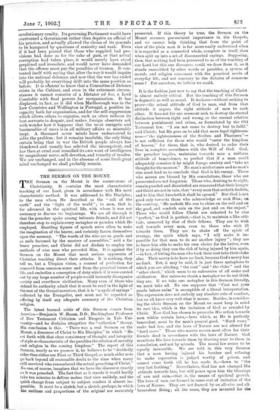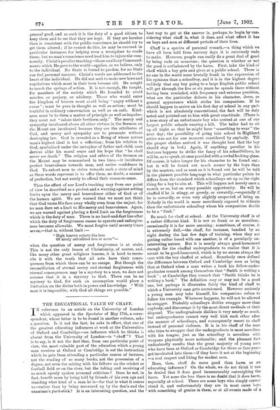THE SERMON ON THE MOUNT.
THE Sermon on the Mount is the corner-stone of Christianity. It contains the most characteristic teaching of our Lord, given in accordance with His most characteristic method. It was addressed to His Disciples ; to the men whom He described as the " salt of the earth" and the "light of the world " ; to men, that is, far advanced in the spiritual life, with whom it was not necessary to discuss its beginnings. We see all through it that the preacher spoke among. intimate friends, and did not therefore stop to explain every metaphor or paradox which He employed. Startling figures of speech serve often to wake the imagination of the hearer, and certainly fasten themselves upon the memory. " The words of the wise are as goads and as nails fastened by the masters of assemblies," said a far lesser preacher, and Christ did not disdain to employ the methods of wise men who preceded Him. It is against the Sermon on the Mount that most serious opponents of Christian teaching direct their attacks. It is nothing, they tell us, but a Utopian vision, a counsel of perfection far removed from common-sense and from the practical issues of life, and embodies a conception of duty which if it were carried out by any large number of people would instantly disorganise society and overthrow civilisation. Many even of those who defend its authority admit that it must be read in the light of the rest of the Gospel narrative, that it is " a cycle of sayings " collected by the Evangelist, and must not be regarded as offering by itself any adequate summary of the Christian religion.
The latest learned critic of this Sermon comes from America—Benjamin W. Bacon, D.D., Buckingham Professor of New Testament Criticism and Exegesis in Yale Uni- versity—and he disdains altogether the " collection " theory. His conclusion is this. " There was a real Sermon on the Mount, a discourse of Christ to His Disciples," in which " He set forth with that clear consistency of thought and integrity of style so characteristic of the parables the relation of morality and religion in the coming kingdom." The report of this Sermon, nearly as we possess it, he believes to be " decidedly older than either our First or Third Gospel, so much older as to go back beyond all reasonable doubt to the time when many still survived who remembered the actual preaching of Christ." No one, of course, imagines that we have the discourse exactly as it was preached. The fact that as it stands it would hardly take ten minutes to deliver makes that view unlikely, and the quick change from subject to subject renders it almost im- possible. It must be a sketch, but a sketch, perhaps, in which the outlines and proportions of the original are accurately preserved. If this theory be true, the Sermon on the Mount assumes pre-eminent importance in the Gospels, and we cannot help thinking that from the point of view of the plain man it is far more easily understood when it is regarded as a connected whole, complete in itself, than when split up into a set of disconnected sayings. Supposing, then, that nothing had been preserved to us of the teaching of our Lord but this one discourse, could we draw from it, as it stands unmodified by other words or parables, a system of morals and religion consonant with the practical needs of everyday life, and not contrary to the dictates of common- sense ? For ourselves, we believe we could.
It is the fashion just now to say that the teaching of Christ is almost entirely ethical. But the teaching of this Sermon is dogmatic as well as moral. It declares—without seeking to prove—the actual attitude of God to man, and from that attitude it argues the right attitude of men to each other. It does not for one moment seek to destroy the eternal distinction between right and wrong, or the eternal relation between punishment and crime, as formulated by the Old Testament law. "I am not come to destroy but to fulfil," said Christ; but He goes on to add that mere legal righteous- ness—" the righteousness of the Scribes and Pharisees "- is not sufficient for those who would "enter the kingdom of heaven," for those, that is, who desired to order their lives in complete accordance with the Will of God. God, the preacher implies, maintains towards man a uniform. attitude of benevolence, so perfect that if a man could adequately conceive it he might forego anxiety and " take no thought for the morrow." No man's misfortunes and no man's sins must lead us to conclude that God is his enemy. Those who mourn are blessed by His consolations, those who are persecuted are not forgotten. Those who, desiring to do right, remain puzzled and dissatisfied are reassured that their hunger and thirst are not in vain, that " every man that seeketh findetb, and to him that knocketh it shall be opened." But God is not good only towards those who acknowledge or seek Him; on the contrary, "He maketh His sun to shine on the evil and on the good, and sendeth rain on the just and on the unjust." Those who would follow Christ are exhorted to be also "perfect," as God is perfect,—that is, to maintain a like atti- tude, unmoved by that of their fellows. They are to wish well towards every man, even to those who wish ill towards them. They are to shake off the spirit of revenge, the spirit which says, " I will make it im- possible for that man to do me another injury" ; they are to leave him able to make his own choice for the better, even if by so doing they run the risk of being injured by him again, —in fact, of letting the man who took their coat take their cloke also. Their mercy is to have no limit, because God's mercy has no limit. But, it may be said, it is just these metaphors to which you are alluding, " the coat" and " the cloke " and the " other cheek," which seem to us subversive of all order and civilisation. But unless we strain a metaphor we do not think they are. If we take one metaphor in this Sermon literally, we must take all. No one supposes that " Cast not your pearls before swine" is susceptible of a literal interpretation. The expression does not embody any absolute rule of conduct, but we all know very well what it means. Besides, in consider- ing the whole Sermon on the Mount we must keep in mind its root idea, which is the imitation of God as revealed by Christ. Now God has chosen to prescribe His action towards men within certain laws,—laws which, as He is perfectly benevolent, must be for man's general good. "Hard cases" make bad law, and the laws of Nature are not altered for "hard cases." Those who mourn mourn most often for their friends dead in accordance with the laws of Nature. God manifests His love towards them by drawing near to them in consolation, and not by miracle. The moral law seems to be equally inexorable. We are told in this very Sermon that a man having injured his brother and refusing to make reparation is judged worthy of prison, and cannot come forth till he has made it,—down to "the very last farthing." Nevertheless, God has not changed His attitude towards him, but still pours upon him the blessings of sun and rain,—that is, the means of spiritual growth. The laws of man are formed in some sort of imitation of the laws of Nature. They are not framed by an all-wise and all- benevolent Being; all the same, they are invented for the
general good, and as such it is the duty of a good citizen to keep them and to see that they are kept. If they are harsher than is consistent with the public conscience, he should try to get them altered ; if he cannot do this, he may be excused in particular instances for helping even a wrongdoer to evade them; but no man's conscience need lead him to injure the com- munity. Christ's peculiar teaching—those auxiliary Command- ments which He gave to the world—applies, as we believe, only to the individual. No State is hound to pardon, for no State can feel personal rancour. Christ's words are addressed to the heart of the individual. He did not seek to make new laws and regulations which must in their turn become old. He sought to touch the springs of action. It is not enough, He taught, for members of the society which He founded to avoid murder, or perjury, or adultery. Those who would enter the kingdom of heaven must avoid being " angry without a cause " ; must be pure in thought as well as action; must be truthful in ordinary conversation as well as on oath. Kind- ness must be to them a matter of principle as well as impulse; they must not " salute their brethren only." The mercy and sympathy inculcated above all other virtues in the Sermon on the Mount are inculcated because they are the attributes of God, and mercy and sympathy are to permeate without destroying law. God is revealed as a Being of whose nature man's highest ideal is but a reflection; from his relation to God, symbolised under the metaphor of father and child, man derives alike his moral sense and his hope that " he shall never see death." The religion and ethics of the Sermon on the Mount may be summarised in two lines,—it inculcates perfect benevolence towards man, and entire confidence in God. To exhort men to strive towards such a state of mind as these words represent is to offer them, no doubt, a counsel of perfection, but not surely to offend their common-sense.
Thus the effect of our Lord's teaching may from one point of view be described as a protest and a warning against setting limits upon the mercy and benevolence either of God or of the human spirit. We are warned that we must not think that God turns His face away wholly even from the unjust, for no man dare set a limit to His mercy and benevolence. Again, we are warned against placing a fixed limit on the forgiveness which is the duty of man. There is no hard-and-fast line after which the duty of forgiveness ceases to operate and unforgive- ness becomes allowable. We must forgive until seventy times seven,—that is, without limit "High heaven rejects the lore Of nicely calculated less or more when the question of mercy and forgiveness is at stake. This is not the only lesson of Christianity, of course, and, like many other great religious lessons, it is bard to recon- cile it with the truth that all acts have their conse- quences from which there can be no escape. But though the reconciliation of eternal mercy and eternal forgiveness with eternal consequences may be a mystery to a man, we dare not assume that it is a mystery to God. There can be no mystery to God, for such an assumption would place a limitation on the divine both in power and knowledge. " With man it is impossible; with God all things are possible."







































 Previous page
Previous page